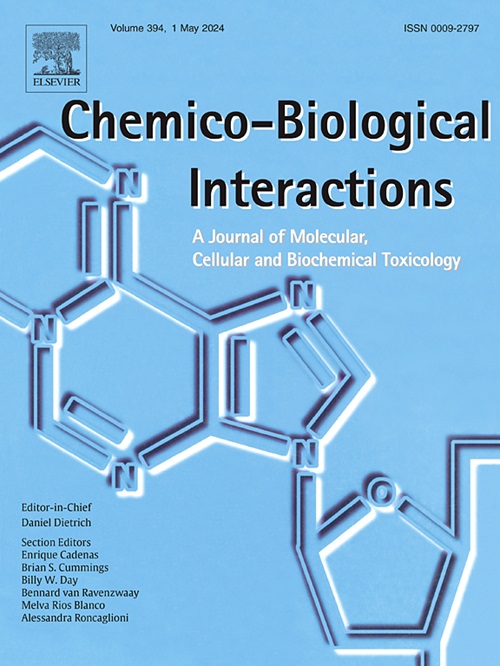Luteolin prevents axitinib-induced kidney damage in mice
IF 5.4
2区 医学
Q1 BIOCHEMISTRY & MOLECULAR BIOLOGY
引用次数: 0
Abstract
Axitinib, a tyrosine kinase inhibitor (TKI) with antiangiogenic effects, is used in anticancer therapy. Axitinib can cause dose-limiting adverse reactions such as proteinuria and renal function impairment, but the mechanisms remain unclear. This study aims to elucidate the mechanism of axitinib-induced proteinuria and potential intervention strategies. We employed C57BL/6 mice as the primary subjects, administering axitinib (50 mg/kg/day) for 1 week, along with luteolin (100 mg/kg/day) to observe its protective effects. Our findings demonstrated that axitinib induced elevated urinary protein and creatinine levels in C57BL/6 mice, resulting in pathological changes in glomeruli, including thickened glomerular basement membrane (GBM), podocyte foot process effacement, disruption of the filtration slit diaphragm structure, and collagen deposition. Axitinib significantly reduced the protein expression of podocyte filtration barrier core functional proteins (nephrin, podocin, and podocalyxin) and upregulated transient receptor potential channel 6 (TRPC6) expression. Pharmacological inhibition of TRPC6 with SAR7334 alleviated axitinib-induced downregulation of these core proteins. Luteolin exerts a protective effect and demonstrates a stable binding conformation with TRPC6 along with high binding affinity. Our results elucidate that axitinib induces podocyte filtration barrier core protein loss, foot process effacement, glomerulosclerosis, and proteinuria through upregulation of TRPC6 protein expression. Additionally, naturally derived luteolin serves as a potential intervention strategy, providing a theoretical basis for the clinical prevention and treatment of nephrotoxicity caused by axitinib and other TKIs.
木犀草素可预防阿西替尼引起的小鼠肾损伤。
阿西替尼是一种具有抗血管生成作用的酪氨酸激酶抑制剂(TKI),用于抗癌治疗。阿西替尼可引起剂量限制的不良反应,如蛋白尿和肾功能损害,但其机制尚不清楚。本研究旨在阐明阿西替尼诱导蛋白尿的机制和潜在的干预策略。我们以C57BL/6小鼠为主要实验对象,给予阿西替尼(50 mg/kg/天)1周,同时给予木犀草素(100 mg/kg/天)观察其保护作用。我们的研究结果表明,阿西替尼诱导C57BL/6小鼠尿蛋白和肌酐水平升高,导致肾小球病理改变,包括肾小球基底膜(GBM)增厚、足细胞足突消失、滤过裂隙膈结构破坏和胶原沉积。阿西替尼显著降低足细胞滤过屏障核心功能蛋白(nephrin、podocin和podocalyxin)的蛋白表达,上调瞬时受体电位通道6 (TRPC6)的表达。SAR7334对TRPC6的药理抑制减轻了阿西替尼诱导的这些核心蛋白的下调。木犀草素具有保护作用,与TRPC6具有稳定的结合构象,具有较高的结合亲和力。我们的研究结果表明,阿西替尼通过上调TRPC6蛋白表达诱导足细胞滤过屏障核心蛋白丢失、足突淡化、肾小球硬化和蛋白尿。此外,天然衍生木草素作为一种潜在的干预策略,为临床预防和治疗阿西替尼等TKIs引起的肾毒性提供了理论依据。
本文章由计算机程序翻译,如有差异,请以英文原文为准。
求助全文
约1分钟内获得全文
求助全文
来源期刊
CiteScore
7.70
自引率
3.90%
发文量
410
审稿时长
36 days
期刊介绍:
Chemico-Biological Interactions publishes research reports and review articles that examine the molecular, cellular, and/or biochemical basis of toxicologically relevant outcomes. Special emphasis is placed on toxicological mechanisms associated with interactions between chemicals and biological systems. Outcomes may include all traditional endpoints caused by synthetic or naturally occurring chemicals, both in vivo and in vitro. Endpoints of interest include, but are not limited to carcinogenesis, mutagenesis, respiratory toxicology, neurotoxicology, reproductive and developmental toxicology, and immunotoxicology.

 求助内容:
求助内容: 应助结果提醒方式:
应助结果提醒方式:


